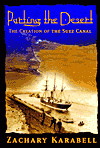Publications : 1273
-
 PublicationParting the Desert: The Creation of the Suez Canal
PublicationParting the Desert: The Creation of the Suez CanalParting the Desert is the first book to be published in English on the fascinating story of the building of the Suez Canal since Lord Kinross's detailed study in 1969 (not to mention the McCullough's Path between the seas (1977) and Wilson's The Suez Canal (1977). Karabell's book is a synthesis of the long battle […]
-
 PublicationCulture and literature: British poetry and the Revolutionary and Napoleonic Wars – Visions of Conflict
PublicationCulture and literature: British poetry and the Revolutionary and Napoleonic Wars – Visions of ConflictIn this literary study, Simon Bainbridge highlights the key role that poetry played in the mediation of the Revolutionary and Napoleonic wars to the British public, and explores the impact that the wars had on poetic practices and theories in the Romantic period. Professor Bainbridge examines the works of authors such as Wordsworth, Coleridge, Byron, […]
-
PublicationThe Allure of Empire: Art in the service of French imperialism
Porterfield's arguement in his book is that the huge battle paintings and the public display of archaeological spoils were both part of the visual culture which promoted modern French imperialism. The principal theory is that France did not fall into imperialism but that imperialism was the result of an official cultureand that the allure of […]
-
PublicationBritish Monarchy and the French Revolution
From the publisher:“What prevented revolution in Britain during the French revolutionary era? How did George III's monarchy withstand republican challenges? This book examines the British monarchy – and the values, beliefs, and images attached to it – during the contentious decade of the 1790s. Through a wide-ranging exploration of loyalist and reform propaganda, newspapers, political […]
-
PublicationThe Duke of Wellington and the British army of occupation in France, 1815-1818
From the publisher: “A relatively unexamined aspect of the career of the Duke of Wellington–his command of allied forces occupying France–serves as the focus of this work. Veve traces the history of the 1815-1818 occupation and the role that Wellington played in making the first multinational peacekeeping force a success. He explores the decisions made […]
-
PublicationThe History of Warfare: the Napoleonic wars
From the Publisher “Napoleon inherited the armies of the French Revolution that had overthrown a monarchy–and used them to conquer a continent on a scale never seen before. Napoleon developed what was perhaps the world's first “superpower,” setting a pattern that would come to fruition in the twentieth century. From descriptions of Bonaparte's rise; […]
-
PublicationNapoleon’s guns 1792-1815 (1): Field Artillery
From the Publisher: “As a young gunner, Napoleon Bonaparte was trained in one of Europe's finest artillery arms. Both the technological sophistication of their weaponry and the skill of their gunners was largely the result of the adoption of the system devised by one man, Jean-Baptiste Vaquette de Gribeauval. Gribeauval's standardised system of parts and […]
-
PublicationNapoleon’s guns 1792-1815 (2): Heavy and Siege Artillery
This volume is the second half of the story of the French artillery during the Revolutionary and Napoleonic Wars. It covers the howitzers, mortars and large siege (16- and 24-pdrs) and garrison (8- and 12-pdrs) guns, placing a special emphasis on their role, technical significance and operational use. The introduction of the Gribeauval system put […]
-
PublicationMaritime Power and the struggle for freedom: naval campaigns that shaped the world, 1788-1857
From the Publisher: “An exploration of the significance of maritime power in shaping the western ideal of political freedom. In the great wars of modern history maritime powers have always prevailed over land-based empires, whether Habsburg, Napoleonic, Nazi or Soviet. This book charts the growth of these powers in various western countries, while also revealing the […]
-
PublicationMalta, Britain, and the European Powers, 1793-1815
This book describes how the island of Malta became a protectorate of the British Crown during the wars against Napoleon after the failures of the Knights of Saint John, republican France, the Two Sicilies, and finally imperial Russia to fill the role of its best defender. Author Desmond Gregory also explains why most, though not […]

